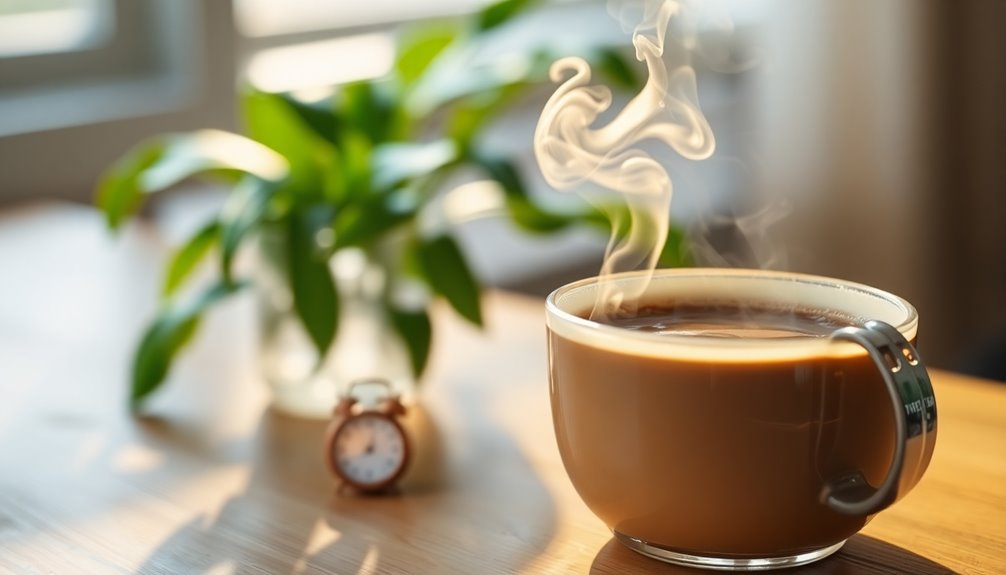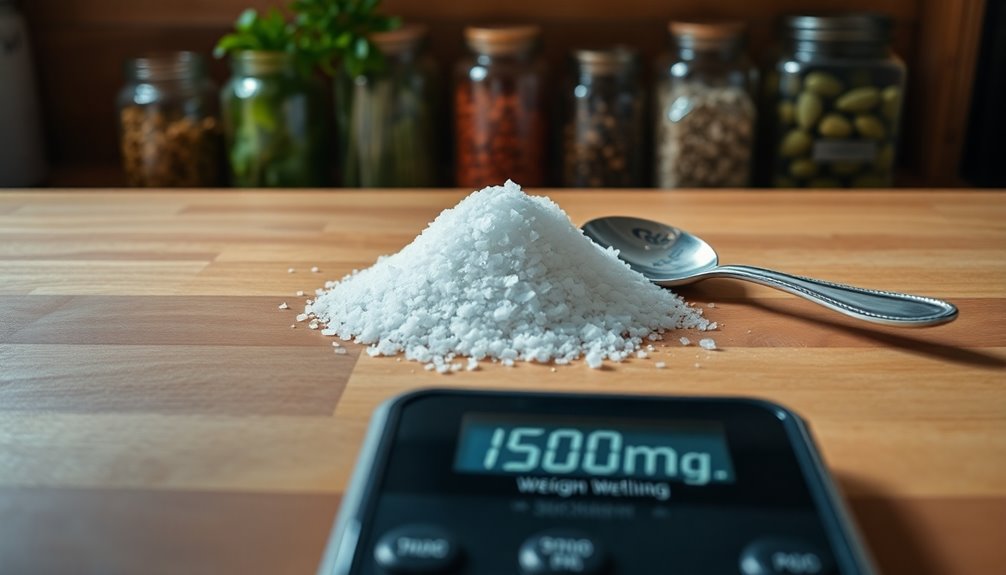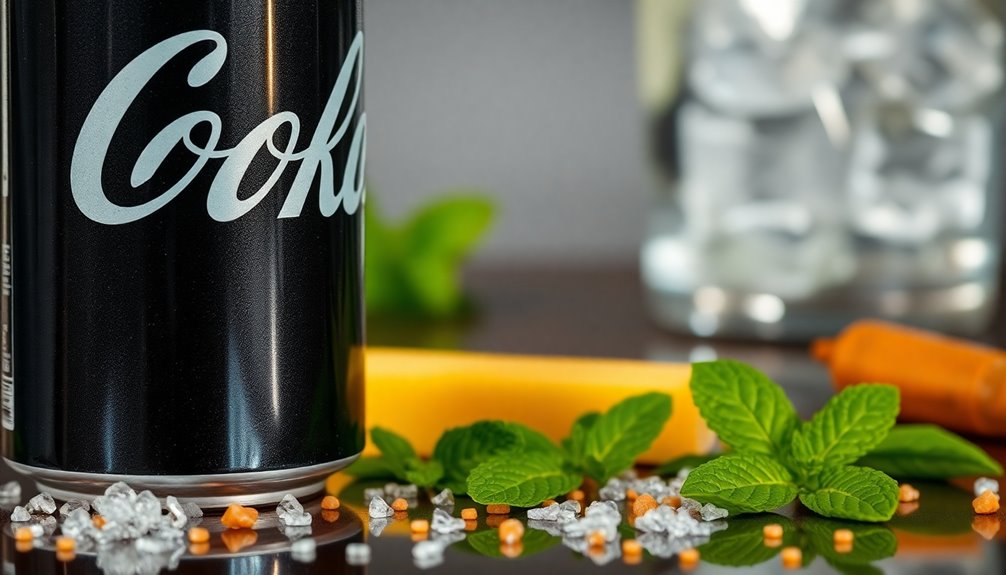If you suffer from GERD, timing your coffee consumption is essential. Aim to enjoy your coffee mid-morning, around 10 a.m., when your energy peaks and symptoms might be less severe. Avoid drinking coffee on an empty stomach, as this can increase acid production. Instead, consider pairing it with meals or waiting at least two hours after eating. Low-acid coffee options, like cold brew, can also be gentler on your stomach. Monitoring your body's response to different coffee types and times will help you find what works best for you. Keep exploring for more helpful tips and insights on managing GERD.
Key Takeaways
- Drink coffee around mid-morning, around 10 am, when energy peaks to reduce reflux severity.
- Avoid coffee on an empty stomach to minimize acid production and discomfort.
- Pair coffee with meals to alleviate potential reflux symptoms effectively.
- Wait at least two hours after eating before drinking coffee to reduce acid reflux risk.
- Experiment with low-acid coffee options to enhance comfort while enjoying your beverage.
Understanding GERD and Its Symptoms

Gastroesophageal reflux disease (GERD) affects many people, causing discomfort and disrupting daily life.
It's characterized by chronic acid reflux, where stomach contents flow back into the esophagus due to a malfunctioning lower esophageal sphincter. You might experience common symptoms like heartburn, regurgitation, bad breath, difficulty swallowing, and chest pain.
These symptoms can vary in intensity, making it essential to pay attention to your body's signals. Risk factors like obesity, smoking, and poor dietary habits can worsen GERD.
To manage symptoms effectively, consider lifestyle modifications such as avoiding trigger foods, eating smaller meals, and elevating your head while sleeping.
Tracking your food intake can help identify personal triggers, allowing you to tailor your approach for relief from GERD.
The Impact of Caffeine on GERD

For many people living with GERD, understanding how different foods and beverages affect their symptoms is essential.
Caffeine, commonly found in coffee and tea, can impact your acid reflux in various ways. Here are some key points to reflect on:
- Caffeine may relax the lower esophageal sphincter (LES), increasing reflux episodes.
- Some studies show caffeine heightens stomach acid production.
- Individual responses to caffeine vary; not everyone will experience discomfort.
- Moderation is recommended instead of complete elimination.
- Keeping a food diary can help identify specific triggers.
Coffee Consumption and Acid Reflux
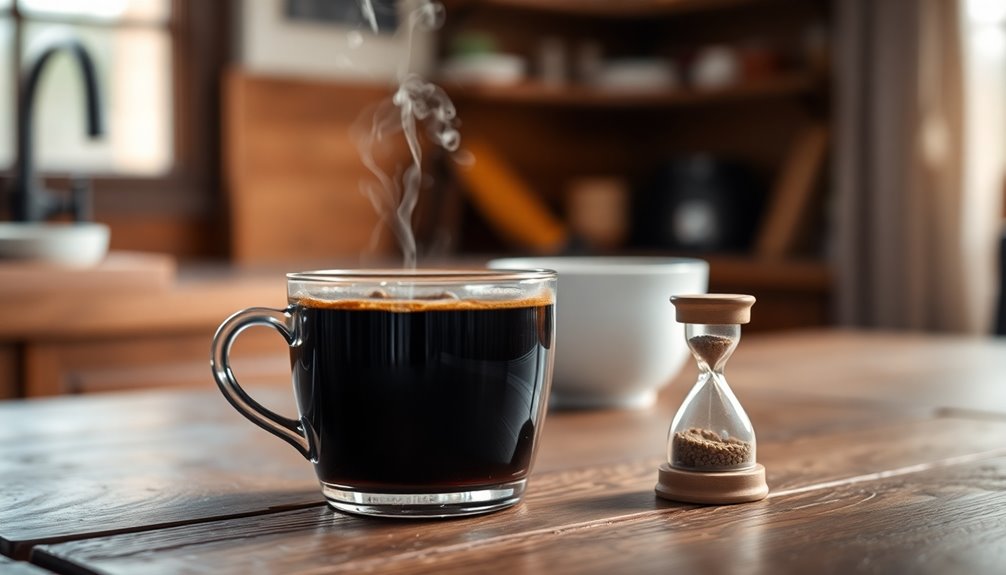
If you struggle with acid reflux, coffee consumption might be a double-edged sword. While it can relax the lower esophageal sphincter, leading to more reflux episodes, there are ways to enjoy your cup without discomfort. Timing your coffee and choosing low-acid options could make all the difference in managing your symptoms. Additionally, understanding how caffeine affects sleep can also guide your coffee consumption decisions throughout the day.
Coffee's Impact on Reflux
While many people enjoy their morning cup of coffee, its impact on acid reflux can be significant. You might experience increased discomfort if coffee stimulates stomach acid production or relaxes the lower esophageal sphincter. On the other hand, some studies have suggested that the benefits of coffee on digestion are related to its potential to enhance gut motility and overall bowel function. It’s important to note that the effects of coffee on acid reflux and digestion can vary from person to person, so it’s best to pay attention to your body’s individual response and make adjustments as needed. If you find that coffee worsens your acid reflux symptoms, you may want to limit your intake or try different brewing methods to minimize its impact.
Consider these factors:
- Drinking coffee on an empty stomach can heighten symptoms.
- Low-acid coffee might help alleviate discomfort for some GERD sufferers.
- Individual responses to coffee vary; some may tolerate it better than others.
- Timing matters; mid-morning consumption could reduce reflux severity.
- Keeping a food diary can help identify your specific triggers related to coffee.
- Additionally, incorporating low-acid coffee varieties may help minimize heartburn symptoms for those with GERD.
Timing and Consumption Tips
To minimize the risk of acid reflux, it's vital to reflect on when and how you drink coffee. For those with GERD, consider consuming coffee in the mid-morning, around 10 am, when cortisol levels peak, enhancing alertness without irritating your stomach.
Avoid drinking coffee on an empty stomach, as this can increase stomach acid production. Pairing your coffee with a meal may help mitigate potential reflux symptoms.
Timing is essential; try to wait at least two hours after eating before enjoying your coffee. Experimenting with low-acid options or cold brew can also make a difference.
Finally, keeping a food diary can help you identify your best timing and consumption methods tailored to your unique symptoms.
#
Low-Acidity Coffee Options
For many individuals with GERD, finding the right coffee can feel like maneuvering through a minefield.
The good news is that low-acidity options can help reduce symptoms associated with acid reflux. Here are some choices to take into account:
- Darker roasts: Generally lower in acidity than lighter ones.
- Cold brew coffee: Up to 70% less acidic than hot brewed varieties.
- Medium-altitude beans: Grown between 900 and 1200 meters, these tend to be gentler on the stomach.
- Decaf with Mountain water method: Reduces acidity while cutting caffeine.
- Pairing with alkaline foods: Foods like avocados and eggs can help balance acidity.
These low-acidity drinks can be your allies in managing GERD while still enjoying your coffee ritual.
Morning Coffee Rituals and Timing

Starting your day with coffee can boost your alertness, especially since cortisol levels peak after waking.
To maximize its effects, consider sipping your brew around 10 am, aligning it with your natural energy dips.
Pairing your coffee with an alkaline breakfast might also help ease any discomfort if you're prone to GERD symptoms. Additionally, understanding the caffeine content in different brewing methods can help you choose a lower-acid option that is gentler on your stomach.
Morning Coffee Benefits
- Boosts alertness and energy levels.
- Caffeine blocks sleep signals, enhancing focus.
- Pairing coffee with alkaline foods can reduce acid reflux.
- Helps improve mood during breakfast.
- Consistent routines can alleviate GERD symptoms.
- Establishing a consistent routine can also align your vibrational state, enhancing overall wellness and reducing stress levels.
Optimal Drinking Time
Morning coffee rituals can set the tone for your day, but figuring out the best time to enjoy that cup can make a difference, especially for those dealing with GERD.
Research suggests that mid-morning, around 10 am, may be the ideal drinking time to enhance alertness without aggravating acid reflux symptoms.
If you're prone to reflux, consider drinking coffee after meals, allowing your digestive system to settle first.
Keeping a food diary can help you track your coffee consumption and its effects on your symptoms.
Eating Before Coffee
Eating before your coffee can greatly impact how your body reacts to caffeine, especially if you're managing GERD.
Starting your day with food can help minimize acid reflux symptoms and enhance your overall coffee experience.
Consider these tips for your morning routine:
- Choose alkaline or calcium-rich foods.
- Opt for a balanced breakfast to aid digestion.
- Monitor your body's reactions by keeping a food diary.
- Aim for mid-morning coffee (around 10 am) for the best alertness.
- Experiment with different foods to find what works for you. Including options like Egg Rollup and Dumpling Sauce can provide a protein-rich start to your day.
Best Practices for Coffee Drinking

To enjoy coffee without triggering GERD symptoms, it's essential to adopt some best practices.
Start by drinking coffee in the mid-morning, around 10 am, when your stomach acidity is lower. Pair your coffee with alkaline foods like avocados or whole grains to help neutralize stomach acid and reduce discomfort.
Opt for low-acid coffee varieties, such as dark roasts or cold brew, which can lessen irritation to your stomach lining. Keeping a food diary can help you identify your personal coffee consumption triggers, allowing you to adjust your habits accordingly.
Finally, remember to drink coffee in moderation and avoid having it on an empty stomach to mitigate increased gastric acid production, which can lead to acid reflux symptoms. Additionally, consider incorporating HEPA filtration in your environment to reduce allergens that may exacerbate GERD symptoms.
## Low-Acidity Coffee Options

For those managing GERD symptoms, choosing low-acidity coffee options can make a significant difference. Here are some great choices to evaluate:
- Cold brew coffee: Up to 70% less acidic than hot brewed coffee.
- Darker roasts: Typically lower in acidity, helping to reduce reflux issues.
- Medium-altitude coffee beans: Grown at 900-1200 meters, these beans often have a smoother taste.
- Low-acid coffee brands: Specifically designed for digestive health, these can be gentler on sensitive stomachs.
- Brewing methods: Use techniques that minimize acidity for a friendlier cup. Additionally, utilizing brewing techniques that emphasize flavor extraction can enhance your coffee experience while keeping acidity levels in check.
Food Pairings to Mitigate Reflux

When you're enjoying your coffee, pairing it with certain foods can help ease the discomfort of GERD symptoms. Opt for food pairings like low-acid fruits, such as bananas, which can help you identify personal triggers while improving tolerance.
Incorporating calcium-rich foods like yogurt or milk can effectively neutralize acidity, making them excellent companions for your coffee. Whole grains, like brown bread or porridge, are another smart choice; their fiber content aids digestion and may alleviate discomfort.
Consider a balanced breakfast that includes protein, healthy fats, and fiber to further mitigate the adverse effects of coffee on acid reflux. Additionally, incorporating healthy fat options like avocado or nut butters can enhance your meal's nutritional profile. Experimenting with these combinations can lead to a more enjoyable coffee experience without the worry of reflux.
Alternative Beverages for GERD Sufferers

Enjoying coffee is a pleasure, but for GERD sufferers, it's important to explore alternative beverages that can provide relief without aggravating symptoms.
Consider these options:
- Herbal teas like chamomile and ginger for their soothing properties.
- Plant-based milks such as almond or oat milk to reduce acid reflux.
- Aloe vera juice to coat the esophagus and lessen irritation.
- Low-acid fruit juices, like diluted apple juice, for a sweet, gentle option.
- Plenty of water throughout the day to aid digestion and dilute stomach acid.
Lifestyle Modifications for Better Management
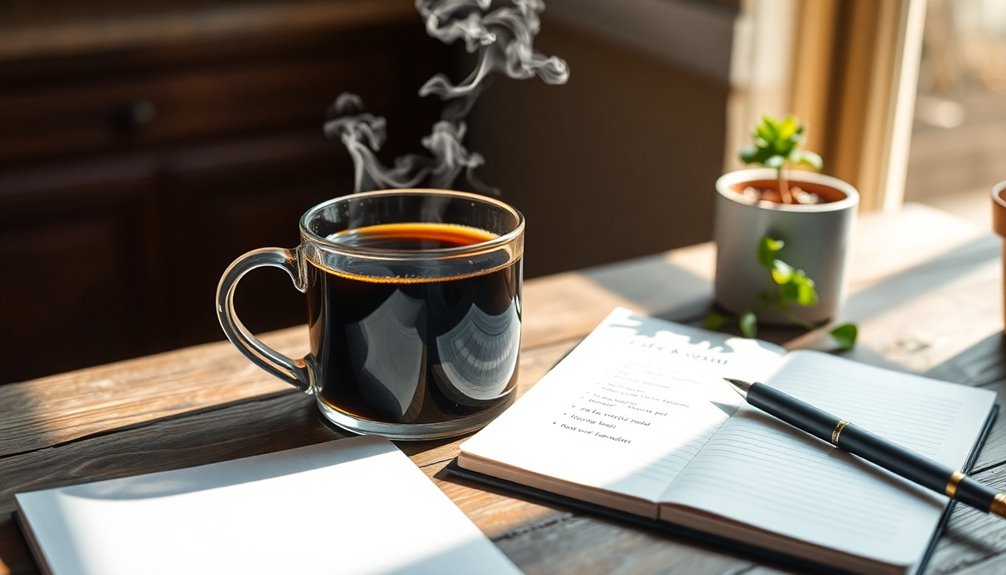
Making simple lifestyle modifications can greatly improve your management of GERD symptoms.
Start by keeping a food diary to track what you eat and identify trigger foods that worsen your acid reflux. Maintaining a healthy weight through regular exercise and a balanced diet is essential since obesity can exacerbate GERD symptoms.
Additionally, avoid consuming coffee and other trigger foods at least two hours before bedtime to minimize nighttime reflux. Elevating the head of your bed by 6 to 8 inches can also prevent acid from flowing back into your esophagus while you sleep.
Finally, wear loose-fitting clothing to reduce pressure on your abdomen, further decreasing the likelihood of acid reflux episodes.
Implementing these lifestyle changes can lead to significant relief.
Frequently Asked Questions
What Is the Best Way to Drink Coffee With GERD?
To drink coffee while managing GERD, you should start by choosing low-acid options like dark roasts or cold brew.
Try to enjoy your coffee after meals instead of on an empty stomach, as this helps buffer acidity.
Pairing it with alkaline foods, like avocados or whole grains, can also reduce symptoms.
Finally, keep a food diary to track what works for you and adjust your coffee habits accordingly.
When Is the Best Time to Drink Coffee to Avoid Acidity?
Imagine your stomach as a calm sea, undisturbed by waves. To keep it serene, aim to drink coffee mid-morning, around 10 a.m. This timing aligns with your body's natural rhythms, enhancing alertness without causing acidity.
Avoid sipping on an empty stomach; instead, enjoy your coffee with food to balance acidity. Also, steer clear of coffee close to bedtime, as it can disrupt your sleep and stir up unwelcome waves of discomfort.
What Is the Best Morning Drink for Acid Reflux?
If you're dealing with acid reflux, the best morning drink is often a soothing herbal tea or decaffeinated coffee.
These options tend to be gentler on your stomach and less likely to trigger symptoms. Drinking on an empty stomach can increase acid production, so pair your drink with a balanced meal.
Low-acid varieties or cold brew can also help minimize discomfort, keeping your morning routine enjoyable and symptom-free.
Should I Stop Drinking Coffee if I Have Acid Reflux?
If you have acid reflux, you don't necessarily need to stop drinking coffee altogether. Individual reactions to coffee vary, so it's important to pay attention to how your body responds.
You might find that decaffeinated coffee is a better option, as it's usually gentler on your system.
Keep a food diary to track your symptoms and identify triggers. Moderation is key; some can enjoy coffee in small amounts without issues.
Conclusion
So, if you think you can sip your coffee like a carefree barista while battling GERD, think again! Timing is everything, and those morning rituals might just have to take a back seat. But hey, who needs acidity when you can embrace low-acid brews and munch on some bland crackers? After all, nothing screams "gourmet coffee experience" like a side of reflux-friendly rice cakes. Cheers to your taste buds—may they forgive you for your caffeine choices!
